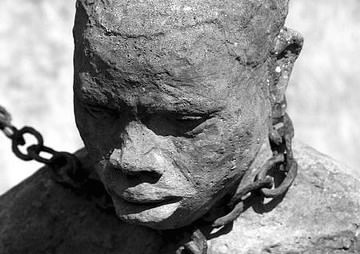A Historian Weighs In on Racism and Economic Inequality
What were “slavery, colonialism, Jim Crow, and urban apartheid if not extreme forms of economic inequality?” Seth Ackerman asks in the magazine Jacobin. "To say that racial inequality is due to hundreds of years of [slavery, colonialism, Jim Crow and urban apartheid] is merely to recount how one particular form of economic inequality came about." (Murky1 / CC BY-SA 2.0)
"To say that racial inequality is due to hundreds of years of [slavery, colonialism, Jim Crow and urban apartheid] is merely to recount how one particular form of economic inequality came about." (Murky1 / CC BY-SA 2.0)
What were “slavery, colonialism, Jim Crow and urban apartheid if not extreme forms of economic inequality?” historian Seth Ackerman asks in the magazine Jacobin.
Ackerman posed the question after Democratic presidential aspirant Hillary Clinton said in a recent Facebook Q&A: “We need to acknowledge some hard truths about race and justice in this country, and one of those hard truths is that racial inequality is not merely a symptom of economic inequality.”
To which Ackerman responded: “If racial inequality isn’t merely a symptom of economic inequality, what is it a symptom of?”
What was the point of England’s colonization of Ireland if not to impose a lucrative “economic inequality” on its victims? Was the urban apartheid of Haussmann’s Paris not the “symptom” of nineteenth-century economic inequality?
And what exactly do you think all those African slaves were doing in the American South?
To quote [Columbia University history professor and author] Barbara Fields:
Probably a majority of American historians think of slavery in the United States as primarily a system of race relations — as though the chief business of slavery were the production of white supremacy rather than the production of cotton, sugar, rice and tobacco. One historian has gone so far as to call slavery ‘the ultimate segregator’. He does not ask why Europeans seeking the ‘ultimate’ method of segregating Africans would go to the trouble and expense of transporting them across the ocean for that purpose, when they could have achieved the same end so much more simply by leaving the Africans in Africa.
No one dreams of analyzing the struggle of the English against the Irish as a problem in race relations, even though the rationale that the English developed for suppressing the ‘barbarous’ Irish later served nearly word for word as a rationale for suppressing Africans and indigenous American Indians. Nor does anyone dream of analyzing serfdom in Russia as primarily a problem of race relations, even though the Russian nobility invented fictions of their innate, natural superiority over the serfs as preposterous as any devised by American racists.
It’s true, of course, that racial inequality is due to hundreds of years of slavery, colonialism, Jim Crow, and urban apartheid — to white supremacy. But to say so is merely to recount how one particular form of economic inequality came about. Just as the story of English imperialism is merely a history of how Ireland — even fifty years after winning independence — found itself the poorest country in all of capitalist Europe.
What Clinton should have said is that racial animosity is not reducible to economic inequality, Ackerman writes. He continues:
… let’s talk about interpersonal animosity, because it’s certainly not irrelevant here. That Texas trooper in the Sandra Bland video I still can’t bring myself to watch — I would be shocked to learn that he’s not a violent racist. Forget “structural” racism for a minute. Let’s talk about plain old-fashioned racism. Let’s stipulate the obvious: the proverbial “hick Texas bigot cop” really doesn’t like black people.
Continue reading here.
— Posted by Alexander Reed Kelly.
Your support matters…Independent journalism is under threat and overshadowed by heavily funded mainstream media.
You can help level the playing field. Become a member.
Your tax-deductible contribution keeps us digging beneath the headlines to give you thought-provoking, investigative reporting and analysis that unearths what's really happening- without compromise.
Give today to support our courageous, independent journalists.






You need to be a supporter to comment.
There are currently no responses to this article.
Be the first to respond.